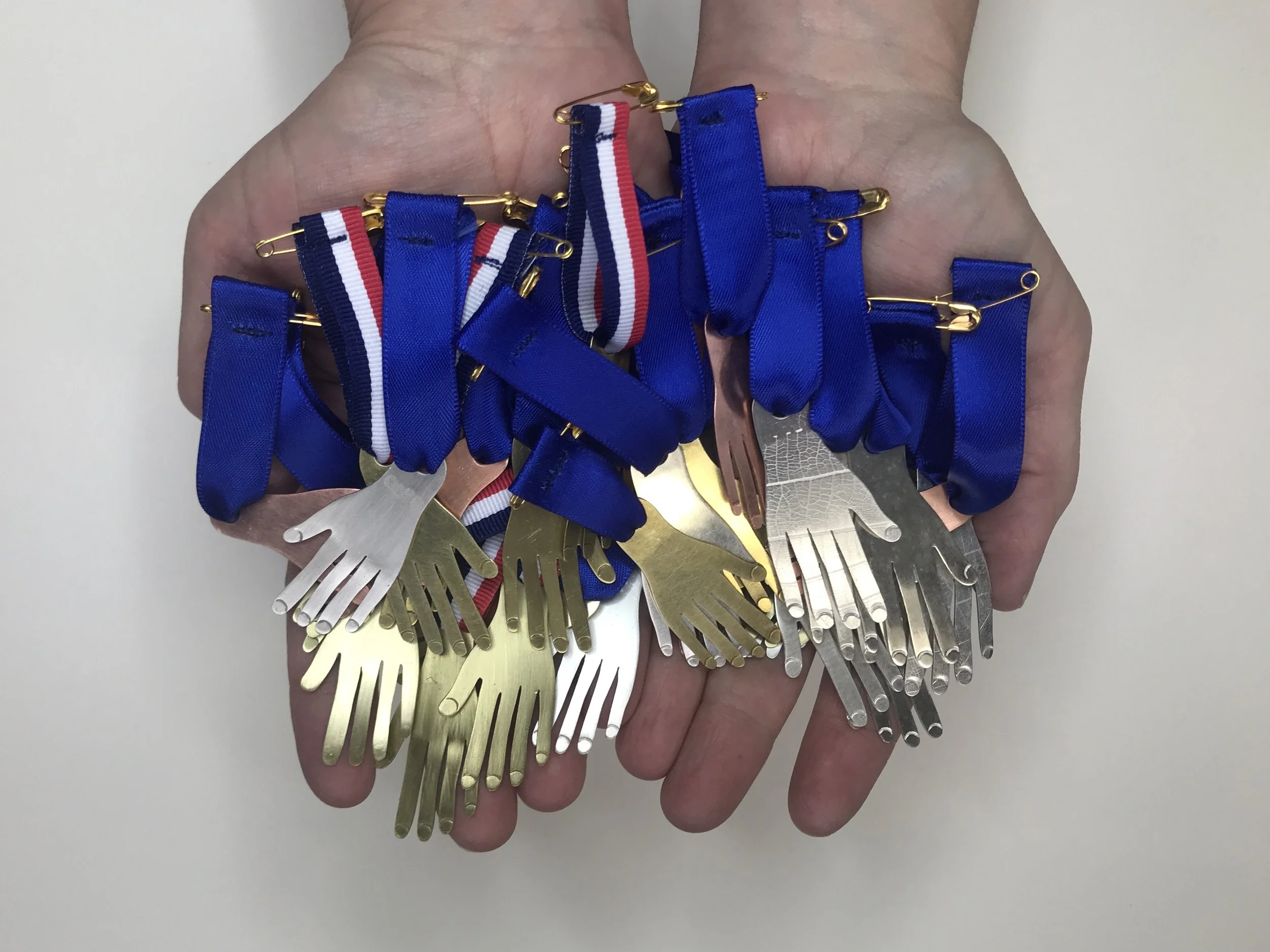Hand Medal Project

Hand Medals from Hand Maker #2872 • sterling silver, copper, brass, ribbon, safety pins • 2020
As Hand Maker #2872, I participated in this global project conceived by Iris Eichenberg and Jimena Ríos by creating 88 Hand Medals for local frontline healthcare workers in Idaho.
As the Hand Keeper for Idaho, I organized and collected 185 Hand Medals total (include the 88 Hand Medals I created) from Boise State University students, alumni, and staff to give to local frontline healthcare workers.
www.stlukesonline.org/blogs/st-lukes/ne…
——————————————————————-
Hand Medal Project
By Elizabeth Essner
"The Hand Medal project was conceived by friends and artists Iris Eichenberg and Jimena Ríos, who first collaborated on the exhibition Verdadero Es lo Hecho: Ex Votos and Contemporary Jewellery, which opened last fall in Buenos Aires and was inspired by ex-votos—handheld objects of devotion that honor a gratitude or a wish. Neither artist could have imagined that their next project would come so quickly, or put the spirit embodied by the ex-voto into active service.
Although the scope of the Hand Medal Project is vast, its aim is straightforward: for artists, jewelers, students, and professionals to craft medals that will honor the service and sacrifice of health workers. Infused with the gratitude of the ex-voto and the tribute of a medal, these hands have been made and collected since April 2020, then bestowed upon medical workers the first Sunday in November.
To implement the project, Eichenberg and Ríos have organized a network of what they call “Hand Keepers,” 145 people who collected the medals from individuals across 66 participating countries. The medals, around 70.000, will then be passed on to “Hand Givers,” who will present them to their local medical communities. Each medal has been registered with a number stamped on the back, allowing recipients to look up the maker of their medal on the project’s website.
However, authorship is secondary in the Hand Medal Project. The medals are not “about the maker, but about the receiver,” the organizers explain. To underscore the unity of this collaborative effort, participants copy a template of the hand, meant to be simple enough for all skill levels, and easily replicated into whatever metal is available. “You make do with what you have to say thank you,” Eichenberg says. Fittingly, this singular hand design creates a collective voice, reinforcing the shared gratitude that is the project’s mission.
The design is drawn from a historical Argentinian ex-voto from Ríos’s collection, its meaning is forged in service. The organizers have looked to metalwork’s historical roots, with Eichenberg noting that as contemporary jewelers, “we sometimes forget that we make objects that often come to life the moment someone else uses [them].”
Unlike a war, our current battle with coronavirus is fought with an enemy invisible to the naked eye, its specter made all the more ominous by its intangibility—a danger you cannot see. By contrast, metal, especially jewelry, is known by its weight and shape against the body. When formed into a medal, it provides a physical testimony for both the unseen virus and invisible bravery of those who have fought it.
Hands themselves have been powerfully present in this battle. They are symbols not only of how our bodies have become weapons to be washed, sanitized, and gloved, but also of their innate power to heal and to connect. For the jeweler, of course, they are the language of skill and expression embodied. The organizers imagined this symbol as a way to acknowledge the multiplicity of meanings in bringing together “hands making hands.” In fact, while the project doesn’t focus on the makers, Eichenberg and Ríos document it via photos showing the makers’ hands in the act of producing the hands.
We’ve come to know this virus through data, refreshing our screens to watch ever-shifting graphs chart its velocity. The Hand Medal Project purposefully speaks the same graphic language—data, maps, charts—in order to offer a counter-narrative. Instead of infection, the Hand Medal Project maps global connections across countries, artists, and—when the medals are distributed later this year—a wealth of health workers tracking the spread of gratitude.
There is no doubt of the incalculable loss and collective fear COVID-19 has caused. But remarkable acts of care have been on the front lines as well, a reminder of the selfless spirit that can only be described as faith. Those who make medals to honor this heroism will identify themselves in many ways—as jewelers, artists, makers, doers—but they’ll all fall under the umbrella of humanity first. This project, in this moment, centers not on what can be created, but on what can be done with the act of creation in service to others. It’s within the acts of the hand—the offer and the receipt—that the Hand Medal Project takes place."